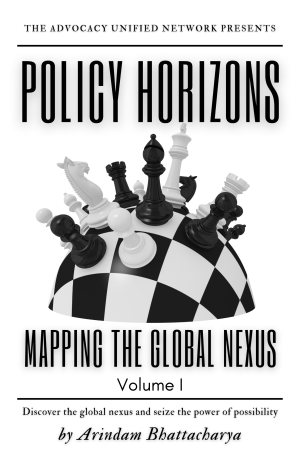The book “Policy Horizons: Mapping the Global Nexus (Vol-I)” by Arindam Bhattacharya stands as a significant contribution to the field of public policy. In an era defined by rapid globalization, the intricacies of policy-making demand a nuanced understanding of the global forces at play. Bhattacharya’s work is a beacon for policymakers, scholars, and practitioners navigating the complex intersections of global trends and governance challenges. This commentary delves into the key features of this groundbreaking book, underscoring its relevance and impact on contemporary public policy discourse.

A Comprehensive Exploration of Global Policy Dynamics
One of the most striking features of “Policy Horizons: Mapping the Global Nexus (Vol-I)” is its comprehensive scope. The book meticulously analyzes how global forces—economic, social, technological, and environmental—intertwine with local governance, shaping policy formulation, implementation, and evaluation. Bhattacharya’s exploration spans across multiple domains, offering readers an in-depth understanding of the critical issues that drive policy decisions in an interconnected world.
The book is structured to provide a layered understanding of public policy. Bhattacharya begins with an examination of globalization’s impact on policy-making, setting the stage for a detailed discussion on the balance between security and civil liberties, cybersecurity, counterterrorism, and more. Each chapter is thoughtfully crafted, integrating theoretical insights with empirical research and real-world case studies. This approach not only enhances the book’s academic rigor but also makes it accessible to a broader audience, including those outside the policy-making sphere.
Globalization and Policy-Making
In “Policy Horizons: Mapping the Global Nexus (Vol-I),” Bhattacharya delves into the profound impact of globalization on policy-making processes. He argues that in an interconnected world, national policies can no longer be formulated in isolation. Global economic trends, transnational challenges like climate change, and international institutions significantly influence local policy decisions. Bhattacharya’s analysis is particularly relevant in the context of contemporary global challenges, where the interplay between local and global dynamics is more pronounced than ever.
The book highlights the need for a holistic approach to policy-making, one that acknowledges the interconnectedness of global forces. Bhattacharya emphasizes that effective governance requires not only a deep understanding of domestic issues but also an awareness of how these issues are shaped by global trends. This perspective is crucial for policymakers seeking to navigate the complexities of governance in the 21st century.
Security vs. Civil Liberties
One of the core themes in Bhattacharya’s book is the delicate balance between security and civil liberties. In today’s world, where security threats are both diverse and pervasive, governments often face the challenging task of protecting their citizens while upholding fundamental rights. Bhattacharya explores this tension in depth, analyzing how different countries approach this balance in various contexts.
Through a series of case studies, the book examines the implications of security policies on civil liberties, shedding light on the trade-offs that policymakers must navigate. Bhattacharya argues that while security is paramount, it should not come at the expense of individual freedoms. He advocates for policies that are both effective in ensuring safety and respectful of human rights, underscoring the importance of maintaining democratic principles even in the face of security threats.
Cybersecurity: A Modern Challenge
In a world increasingly reliant on digital infrastructure, cybersecurity has emerged as a critical area of focus for policymakers. Bhattacharya’s book offers a thorough analysis of cybersecurity challenges, particularly in the context of protecting critical infrastructure. He explores the various dimensions of cybersecurity policy, from the technological aspects to the legal and ethical considerations.
Bhattacharya emphasizes that cybersecurity is not just a technical issue but a governance challenge that requires coordinated efforts at the national and international levels. He highlights the need for robust policies that protect against cyber threats while ensuring that such measures do not infringe on privacy rights. The book provides valuable insights into how countries can enhance their cybersecurity resilience, making it an essential resource for anyone involved in this rapidly evolving field.
Counterterrorism: Balancing Security and Rights
The book also delves into the multifaceted nature of counterterrorism policies, focusing on the critical components of intelligence sharing and border security. Bhattacharya provides a balanced analysis of the effectiveness of various counterterrorism strategies while considering their impact on civil liberties. He discusses the challenges policymakers face in implementing counterterrorism measures that are both effective and just, offering recommendations for creating policies that protect citizens without compromising fundamental rights.
The Role of Democratic Governance
At the heart of Bhattacharya’s analysis is a strong emphasis on democratic governance. He explores how principles like representative democracy, the rule of law, and civic engagement are crucial for ensuring accountable and inclusive governance. The book addresses the persistent challenges posed by institutional weaknesses and fragmentation, highlighting the need for comprehensive reforms to enhance governance effectiveness and resilience.
Bhattacharya’s discussion on fostering civic engagement and participation is particularly noteworthy. He illustrates how civil society organizations play a pivotal role in advocating for social justice, transparency, and accountability. The book presents compelling examples, such as Brazil’s participatory budgeting program and grassroots movements like Black Lives Matter, to demonstrate the transformative potential of citizen participation in governance.
A Practical Guide for Policymakers
“Policy Horizons: Mapping the Global Nexus (Vol-I)” is not just an academic treatise but a practical guide for policymakers. Bhattacharya’s thoughtful analysis and comprehensive approach provide actionable insights and recommendations for enhancing policy resilience and responsiveness in the face of global challenges. His clear and engaging writing style makes complex concepts accessible, ensuring that readers from diverse backgrounds can grasp the nuances of global policy challenges.
Looking Ahead
As the first volume in a series, “Policy Horizons: Mapping the Global Nexus (Vol-I)” sets the stage for future explorations in public policy. The book lays a solid foundation for the forthcoming “Policy Horizons: Mapping the Global Nexus (Vol-II),” which will continue the exploration with topics such as health policy, education policy, cultural policy, migration policy, energy policy, urbanization, digital governance, and international cooperation.
Final Thoughts
Arindam Bhattacharya’s “Policy Horizons: Mapping the Global Nexus (Vol-I)” is a timely and essential contribution to the field of public policy. It offers a comprehensive and nuanced analysis of the global forces shaping contemporary governance, making it an indispensable resource for anyone committed to understanding and shaping the future of public policy. Whether you are a policymaker, scholar, or practitioner, this book provides the tools and insights needed to navigate the complexities of governance in an increasingly interconnected world. The depth of research, combined with Bhattacharya’s clear and engaging style, ensures that this work will resonate with readers across disciplines, fostering informed and effective policy solutions.
Citation:
Ayako, O. (2024). Insights from Policy Horizons: Mapping the Global Nexus (Vol-I). In Advocacy Unified Network. Zenodo. https://doi.org/10.5281/zenodo.13294950
https://orcid.org/0009-0000-7572-8168





